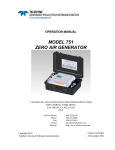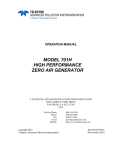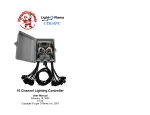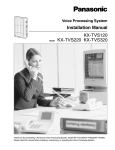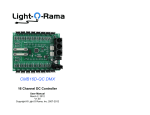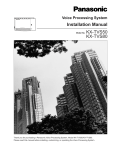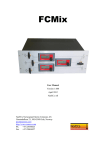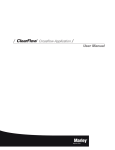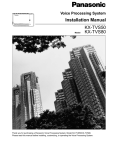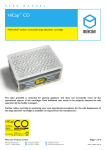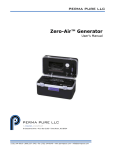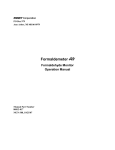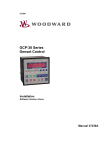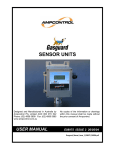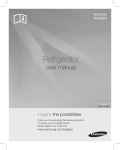Download Teledyne API Model 751 Zero Air Generator
Transcript
OPERATION MANUAL MODEL 751 ZERO AIR GENERATOR © TELEDYNE ADVANCED POLLUTION INSTRUMENTATION 9480 CARROLL PARK DRIVE SAN DIEGO, CA 92121-5201 USA Toll-free Phone: Phone: Fax: Email: Website: Copyright 2014 Teledyne Advanced Pollution Instrumentation 800-324-5190 858-657-9800 858-657-9816 [email protected] http://www.teledyne-api.com/ 07836A DCN6832 10 January 2014 ABOUT THIS MANUAL This Model 751 Zero Air Generator operation manual is comprised of multiple documents as listed below. Part No. Rev Name/Description 07836 A Model 751 User Manual (this manual) 07840 A Model 751 Spare Parts List (in Appendix A of this manual) 078380100 A Model 751 Interconnect List (in Appendix B of this manual) 07838 A Model 751 Interconnect Diagram (in Appendix B of this manual) NOTE Read this manual in its entirety before making any attempt to operate the instrument. REVISION HISTORY 751 Manual , PN 07836 Date Rev DCN 10 Jan 2014 A 6832 07836A DCN6832 Description Initial Release i This page intentionally left blank. ii 07836A DCN6832 SAFETY MESSAGES Important safety messages are provided throughout this manual for the purpose of avoiding personal injury or instrument damage. Please read these messages carefully. Each safety message is associated with a safety alert symbol, and are placed throughout this manual and inside the instrument. The symbols with messages are defined as follows: WARNING: Electrical Shock Hazard HAZARD: Strong oxidizer GENERAL WARNING/CAUTION: Read the accompanying message for specific information. CAUTION: Hot Surface Warning Do Not Touch: Touching some parts of the instrument without protection or proper tools could result in damage to the part(s) and/or the instrument. Technician Symbol: All operations marked with this symbol are to be performed by qualified maintenance personnel only. Electrical Ground: This symbol inside the instrument marks the central safety grounding point for the instrument. CAUTION This instrument should only be used for the purpose and in the manner described in this manual. If you use this instrument in a manner other than that for which it was intended, unpredictable behavior could ensue with possible hazardous consequences. NEVER use any gas analyzer to sample combustible gas(es)! Note For Technical Assistance regarding the use and maintenance of this instrument or any other Teledyne API product, contact Teledyne API’s Technical Support Department: Telephone: 800-324-5190 Email: [email protected] or access any of the service options on our website at http://www.teledyne-api.com/ 07836A DCN6832 iii CONSIGNES DE SÉCURITÉ Des consignes de sécurité importantes sont fournies tout au long du présent manuel dans le but d’éviter des blessures corporelles ou d’endommager les instruments. Veuillez lire attentivement ces consignes. Chaque consigne de sécurité est représentée par un pictogramme d’alerte de sécurité; ces pictogrammes se retrouvent dans ce manuel et à l’intérieur des instruments. Les symboles correspondent aux consignes suivantes : AVERTISSEMENT : Risque de choc électrique DANGER : Oxydant puissant AVERTISSEMENT GÉNÉRAL / MISE EN GARDE : Lire la consigne complémentaire pour des renseignements spécifiques MISE EN GARDE : Surface chaude Ne pas toucher : Toucher à certaines parties de l’instrument sans protection ou sans les outils appropriés pourrait entraîner des dommages aux pièces ou à l’instrument. Pictogramme « technicien » : Toutes les opérations portant ce symbole doivent être effectuées uniquement par du personnel de maintenance qualifié. Mise à la terre : Ce symbole à l’intérieur de l’instrument détermine le point central de la mise à la terre sécuritaire de l’instrument. MISE EN GARDE Cet instrument doit être utilisé aux fins décrites et de la manière décrite dans ce manuel. Si vous utilisez cet instrument d’une autre manière que celle pour laquelle il a été prévu, l’instrument pourrait se comporter de façon imprévisible et entraîner des conséquences dangereuses. NE JAMAIS utiliser un analyseur de gaz pour échantillonner des gaz combustibles! iv 07836A DCN6832 WARRANTY WARRANTY POLICY (02024G) Teledyne Advanced Pollution Instrumentation (TAPI), a business unit of Teledyne Instruments, Inc., provides that: Prior to shipment, TAPI equipment is thoroughly inspected and tested. Should equipment failure occur, TAPI assures its customers that prompt service and support will be available. COVERAGE After the warranty period and throughout the equipment lifetime, TAPI stands ready to provide on-site or in-plant service at reasonable rates similar to those of other manufacturers in the industry. All maintenance and the first level of field troubleshooting are to be performed by the customer. NON-TAPI MANUFACTURED EQUIPMENT Equipment provided but not manufactured by TAPI is warranted and will be repaired to the extent and according to the current terms and conditions of the respective equipment manufacturer’s warranty. Product Return All units or components returned to Teledyne API should be properly packed for handling and returned freight prepaid to the nearest designated Service Center. After the repair, the equipment will be returned, freight prepaid. The complete Terms and Conditions of Sale can be reviewed at http://www.teledyneapi.com/terms_and_conditions.asp CAUTION – Avoid Warranty Invalidation Failure to comply with proper anti-Electro-Static Discharge (ESD) handling and packing instructions and Return Merchandise Authorization (RMA) procedures when returning parts for repair or calibration may void your warranty. For anti-ESD handling and packing instructions please refer to the manual, Fundamentals of ESD, PN 04786, in its “Packing Components for Return to Teledyne API’s Customer Service” section. The manual can be downloaded from our website at http://www.teledyne-api.com under Help Center > Product Manuals in the Special Manuals section. RMA procedures are under Help Center > Return Authorization. 07836A DCN6832 v This page intentionally left blank. vi 07836A DCN6832 TABLE OF CONTENTS ABOUT THIS MANUAL ........................................................................................................... I REVISION HISTORY............................................................................................................... I SAFETY MESSAGES ............................................................................................................. III 1 INTRODUCTION ......................................................................................... 9 1.1 1.2 PREFACE ................................................................................................................... 9 MODEL 751 FEATURES ............................................................................................... 9 2 SPECIFICATIONS AND APPROVALS ..................................................... 10 2.1 SPECIFICATIONS....................................................................................................... 10 2.2 APPROVALS AND CERTIFICATIONS ............................................................................. 11 2.2.1 Safety .............................................................................................................. 11 2.2.2 EMC ................................................................................................................. 11 3 GETTING STARTED................................................................................ 3-1 3.1 UNPACKING ............................................................................................................ 3-1 3.2 INSTALLATION ......................................................................................................... 3-1 3.3 INSTRUMENT PANEL ................................................................................................ 3-2 3.4 ELECTRICAL AND PNEUMATIC CONNECTIONS ............................................................. 3-3 3.4.1 ELECTRICAL.................................................................................................. 3-3 3.4.2 PNEUMATICS ................................................................................................ 3-3 3.5 POWER-UP............................................................................................................. 3-3 3.6 STORAGE AND TRANSPORTATION ............................................................................. 3-4 3.7 EXPENDABLE KITS (OPT 42A) ................................................................................. 3-1 3.8 SILICA GEL KITS (OPT 42B&C) ............................................................................... 3-1 3.9 FLOW RESTRICTOR (OPT 72B) ............................................................................... 3-1 4 OPERATION ............................................................................................ 4-1 4.1 OVERVIEW .............................................................................................................. 4-1 4.2.1 Intake Filter ..................................................................................................... 4-4 4.2.2 Compressor .................................................................................................... 4-4 4.2.3 Cooling Coil .................................................................................................... 4-5 4.2.4 Pressure Relief Valve ..................................................................................... 4-5 4.2.5 Water Trap ...................................................................................................... 4-5 4.2.6 Water Drain Valve .......................................................................................... 4-5 4.2.7 Silica Gel Desiccant ........................................................................................ 4-5 4.2.8 Pressure Regulator ......................................................................................... 4-6 4.2.9 NO Scrubber ................................................................................................... 4-6 4.2.10 Charcoal Scrubber ....................................................................................... 4-6 4.2.11 Optional Carbon Monoxide (CO) Scrubber .................................................. 4-6 4.2.12 Final Filter .................................................................................................... 4-6 4.2.13 Pressure Gauge........................................................................................... 4-6 4.2.14 Controller ..................................................................................................... 4-7 4.2.15 Front Panel Indicator Lights ......................................................................... 4-8 07836A DCN6832 vii 4.2.16 Dew Point Sensor ........................................................................................ 4-8 5 MAINTENANCE ....................................................................................... 5-1 5.1 SCHEDULE .............................................................................................................. 5-1 5.2 CLEANING............................................................................................................... 5-2 5.3 CHECKING THE TUBING ........................................................................................... 5-2 5.4 REPLACING THE CHARCOAL SCRUBBER MEDIA .......................................................... 5-2 5.5 REPLACING THE NO - NO2 SCRUBBER MEDIA ........................................................... 5-3 5.6 REPLACING THE OPTIONAL CO SCRUBBER ............................................................... 5-4 5.7 REPLACING THE SILICA GEL DESICCANT ................................................................... 5-4 5.8 LEAK CHECK ........................................................................................................... 5-5 5.9 FILTER REPLACEMENT ............................................................................................. 5-6 5.9.1 Intake Filter ..................................................................................................... 5-6 5.9.2 Final Filter ....................................................................................................... 5-6 6 TROUBLESHOOTING ............................................................................. 6-1 APPENDIX A - SPARE PARTS ..........................................................................................A-1 APPENDIX B - SCHEMATICS ...........................................................................................B-1 LIST OF FIGURES FIGURE 3-1: FIGURE 4-1: FIGURE 4-2: FIGURE 4-3: FIGURE 4-4: MODEL 751 STARTUP CONNECTIONS ................................................................................... 3-2 PNEUMATIC DIAGRAM .......................................................................................................... 4-2 INSTRUMENT PLAN VIEW ..................................................................................................... 4-3 INSTRUMENT PANEL ............................................................................................................. 4-4 CONTROL BOARD LAYOUT ................................................................................................... 4-7 LIST OF TABLES TABLE 2-1: TABLE 4-1: TABLE 5-1: TABLE 6-1: viii SPECIFICATIONS ...................................................................................................................... 10 POWER AND DEW POINT CONDITION INDICATORS ................................................................. 4-8 MAINTENANCE SCHEDULE..................................................................................................... 5-1 TROUBLESHOOTING ............................................................................................................... 6-1 07836A DCN6832 1 INTRODUCTION 1.1 Preface The Model 751 (or 751) is an excellent source of clean, dry air for dilution calibrators. It also may be used as a source of purge air for permeation tube ovens, zero air for ozone generators. The 751 has an oil-free and diaphragm-free pump that pushes the air through silica gel desiccant for drying. The pump then routes the dry air through multiple scrubbers that remove SO2, NO, NO2, O3, H2S, and CO; the outlet air passes through a final filter to assure a clean, dry, analytical zero air supply. The silica gel desiccant removes water yielding gas with a dewpoint of less than -20°C (up to 5 SLPM flow rate) independent of the inlet dewpoint. A microcontroller cycles the water trap valve to prevent the pump from starting against full head pressure. The 751 is an ideal accessory to the Model 700E Mass Flow Calibrator or Model 702 Single Point Calibrator as a zero air source for analyzers. 1.2 Model 751 Features Long life scrubbers for SO2, NO, NO2, O3, H2S, and CO (option) Automatic water drain Silica gel desiccant for water removal independent of inlet dewpoint Source of purge air for permeation tube ovens Source of zero air for Ozone Generators 07836A DCN6832 9 Specifications and Approvals Teledyne API Model 751 Zero Air Generator 2 SPECIFICATIONS AND APPROVALS 2.1 Specifications Table 2-1: Specifications Parameter Specification Output 5 SLPM at 30 psig Max delivery pressure 30 psig Dewpoint < -20 C (until desiccant saturated) SO2 <0.5 ppb NO <0.5 ppb Output Concentration NO2 <0.5 ppb O3 <0.5 ppb CO< 0.025 ppm (requires CO Scrubber option) Compressor Single-cylinder, internal long-life, oil-less piston pump Dimensions 7” x 18.5” x 14” (178 x 470 x 356 mm) Weight 24 lbs (10.9 kg) Operating Temp 5-40 C Power Environmental Conditions Typical Power Consumption 110-120 V~, 60 Hz, 4.0 A 105W 220-240 V~, 50 Hz, 3.0 A 130W Installation Category (Over Voltage Category ) II Pollution Degree 2 Intended for Indoor Use Only at Altitudes 2000m Mains Supply Voltage Fluctuations not to exceed ± 10% of the nominal voltage Transient Over Voltages according to Over Voltage Category II 10 07836A DCN6832 2.2 Approvals and Certifications The Teledyne-API Model 751 Zero Air Generator was designed, tested and certified for Safety and Electromagnetic Compatibility (EMC). This section presents the compliance statements for those requirements and directives. For additional certifications, please contract Technical Support at 1-800-324-5190 or [email protected]. 2.2.1 Safety IEC/EN 61010-1:2010 (3rd Edition), Safety requirements for electrical equipment for measurement, control and laboratory use. CE: 2006/95/EC, Low-Voltage Directive 2.2.2 EMC IEC/EN 61326-1, Class A Emissions/Industrial Immunity EN55011 (CISPR 11), Group 1, Class A Emissions FCC 47 CFR Part 15B, Class A Emissions CE: 2004/108/EC, Electromagnetic Compatibility Directive 07836A DCN6832 11 Specifications and Approvals Teledyne API Model 751 Zero Air Generator This page intentionally left blank. 12 07836A DCN6832 3 GETTING STARTED This section provides instructions on the proper installation and power-up of the 751. NOTE Due to mounting screws through its case, the 751 is not considered waterproof. 3.1 Unpacking 1. Verify that there is no shipping damage. If there are signs of damage, immediately advise the shipper, then Teledyne API. 2. Remove the 751 from its shipping carton. 3. Open the lid and check for damage inside. 4. Check the line voltage and frequency label on the instrument to ensure that it matches the local power source. 3.2 Installation The basic 751 is a portable, self-contained instrument; there are no installation instructions other than to ensure adequate support for its weight. However, the connections must be made to the instrument panel with the lid open (see Section 3.4 for connection instructions). CAUTION TO AVOID PERSONAL INJURY OR DAMAGE TO THE INSTRUMENT, ALWAYS OPERATE THE 751 WITH THE LID OPEN. 07836A DCN6832 3-1 Getting Started Teledyne API Model 751 Zero Air Generator 3.3 Instrument Panel Figure 3-1 illustrates the Model 751 instrument layout and key connections for startup. Figure 3-1: Model 751 Startup Connections 3-2 07836A DCN6832 Teledyne API Model 751 Zero Air Generator Getting Started 3.4 Electrical and Pneumatic Connections 3.4.1 ELECTRICAL NOTE To maintain compliance with EMC standards, it is required that the power cord length be no greater than 3 meters. Connect the power cord from the AC input connection to the proper power source. CAUTION ENSURE THAT THE POWER CORD IS PROPERLY GROUNDED AND ADEQUATELY RATED FOR THE SPECIFIED POWER RATING OF THIS INSTRUMENT (SEE SPECIFICATIONS TABLE). 3.4.2 PNEUMATICS Make the following pneumatic connections: DRAIN (1/4” push-to-connect bulkhead union) Connect 1/4” diameter tubing to the Drain Fitting (refer to Figure 3-1) to avoid the occasional spurts of water ejecting from the fitting. Ensure the tubing is long enough that the water ejects outside the instrument. ZERO AIR OUT (1/4” swage-type bulkhead union) Connect the ZERO AIR OUT port of the 751 to the INLET fitting of the Model 700 Calibrator with clean 1/4” TFE tubing. Keep this line as short as possible to minimize pressure drops. The pressure in this line is adjustable, but should normally be 30 ± 5 psig. 3.5 Power-Up NOTE: DO NOT BLOCK THE COOLING FAN (LOCATED BENEATH THE COVER PANEL); ALWAYS KEEP LID OPEN WHEN INSTRUMENT IS RUNNING. 1. Turn on the instrument panel POWER SWITCH (Figure 3-1). 2. The instrument panel POWER LED should light. 07836A DCN6832 3-3 Getting Started Teledyne API Model 751 Zero Air Generator 3. The cooling fan should start immediately. 4. The compressor should start after a few seconds delay. The delay is to allow the control board to measure the local line frequency. 5. After 30 to 60 seconds, the instrument panel pressure gauge should read 30 psig. 6. When the DEW POINT LED is lit green, it indicates that the 751 is producing clean dry air. NOTE If the 751 has been unused for several days, it may take up to 30 minutes to achieve final purity and dryness. 3.6 Storage and Transportation If the 751 will not be used for an extended period of time or will be transported, the following procedure applies: 1. Turn off the 751. 2. Wait approximately 1 minute. 3. Turn on the 751. The water drain valve will switch into the open position and vent any accumulated water through the water drain. (Standing H2O will cause corrosion) 4. Turn the 751 off. This shut down process will vent any water that has accumulated in the coalescing filter. It will prevent this water from passing into the 751 in the event that the instrument is inverted during storage or shipment. 3-4 07836A DCN6832 3.7 Expendable Kits (OPT 42A) A one-year supply of scrubber media and outlet filter are available from Teledyne API as Option 42A. Refer to Appendix B for a list of expendables. 3.8 Silica Gel Kits (OPT 42B&C) An additional supply of Silica Gel media is available from Teledyne API as Option 42B. A spare Silica Gel dryer cartridge is available from Teledyne-API as Option 42C. Refer to Appendix B for a list of expendables. 3.9 Flow Restrictor (OPT 72B) A flow restrictor is available in order to run the 751 without a calibrator or other method of flow restriction. It is connected to the outlet fitting and restricts the air flow to 4 SLPM. The flow is pressure dependent, which is adjustable by adjusting the pressure regulator. 07836A DCN6832 3-1 Getting Started Teledyne API Model 751 Zero Air Generator This page intentionally left blank. 3-2 07836A DCN6832 4 OPERATION 4.1 Overview The 751 dries and scrubs ambient air to produce zero air. Error! Reference source not found. illustrates the path of the air being routed through the 751. First, the compressor draws air in through the inlet filter. At the compressor outlet, the air is under pressure and hot from the compression. The relative humidity is high as a result of the high pressure. The air then is conducted through the cooling coil where heat is removed by transfer to the cooling fan air. With the high pressure and the temperature reduced to ambient level, the relative humidity is at its highest. At this point, the air is usually supersaturated. From the cooling coil, the damp air passes through a coalescing filter where the excess water is separated and settles in the bottom of the filter. The controller periodically opens the solenoid drain valve allowing the water to be expelled through a drain fitting. This partially dried air flows through a canister of silica gel desiccant, which traps and absorbs the remaining water and a portion of the other contaminants. The pressure relief valve may open occasionally and can be loud, but this is a normal part of the operation for the 751. As the air leaves the silica gel canister, its pressure is controlled to 30 psig by an air pressure regulator mounted on the instrument panel. This maintains a constant pressure at the calibrator inlet and is displayed by the pressure gauge on the 751 instrument panel. For a final clean-up, the dry, regulated air enters the specific scrubbers as follows: 1. The NO scrubber where NO is oxidized to NO2. 2. The activated charcoal scrubber where the NO2, O3, SO2 and H2S are absorbed. 3. The optional CO scrubber, where CO is catalytically oxidized to CO2. 4. The clean, dry air passes through a fine particulate filter and leaves the 751 through the instrument panel bulkhead union (Zero Air Out). 07836A DCN6832 4-1 Operation Teledyne API Model 751 Zero Air Generator 751 Chassis Pressure Relief Valve Inlet Filter Condenser Coalescer “AIR IN” 5 LPM Pump Pressure Regulator Drain Valve 30 Pressure Gauge 0 Purafil Scrubber DFU Filter Charcoal Scrubber “ZERO AIR OUT” CO Scrubber * Dewpoint Sensor Silica Gel Desiccant “DRAIN OUT” 60 * Optional Equipment Figure 4-1: Pneumatic Diagram 4-2 07836A DCN6832 Teledyne API Model 751 Zero Air Generator Operation Figure 4-2: Instrument Plan View 07836A DCN6832 4-3 Operation Teledyne API Model 751 Zero Air Generator Figure 4-3: Instrument Panel 4.2 Components This section describes the main components of the 751. 4.2.1 Intake Filter The intake filter is a serviceable assembly that houses a disposable paper filter element. Section 5 provides maintenance instructions. 4.2.2 Compressor The compressor is a single-cylinder oscillating piston type driven by a split capacitor AC motor. The compressor is dry; that is, there are no lubricants which can contaminate the compressed air. The pistons are sealed by flexible TFE piston rings, and after a short run-in period to seat the rings, should last for years. There are no diaphragms. The compressor is mounted on a sub-plate which is supported on four, tuned vibration isolators. 4-4 07836A DCN6832 Teledyne API Model 751 Zero Air Generator Operation 4.2.3 Cooling Coil The cooling coil consists of several turns of copper tubing coiled to form a cylinder through which the cooling fan blows outside air. 4.2.4 Pressure Relief Valve The pressure relief valve is a device designed to limit the maximum pressure to which the 751 can be subjected. It is set to open at 75-80 psig. The valve may open and make a hissing sound. This is normal operation and does not mean there is a problem with the unit. CAUTION DO NOT ADJUST THE RELIEF VALVE. 4.2.5 Water Trap The water trap is a coalescing type. Supersaturated air enters the trap and is rapidly swirled causing the water droplets to deposit on a membrane where the drops coalesce and gather in a puddle at the bottom of the filter bowl. 4.2.6 Water Drain Valve Accumulated water is drained from the filter through a stainless steel solenoid-operated valve. The valve is sequenced by the controller and is pulsed open every minute to remove water from the filter bowl. CAUTION THE WATER/AIR SPRAY LEAVING THE DRAIN FITTING SPURTS AT A HIGH VELOCITY AND MUST BE CONDUCTED THROUGH A LENGTH OF TUBING AWAY FROM ANY SENSITIVE COMPONENTS. The operation cycle has been preset at the factory and is not adjustable. 4.2.7 Silica Gel Desiccant The silica gel desiccant absorbs the remaining moisture from the air. Silica gel has a finite life and changes color as it becomes saturated. We recommend that it be replaced when the dewpoint indicator changes from green to yellow. 07836A DCN6832 4-5 Operation Teledyne API Model 751 Zero Air Generator 4.2.8 Pressure Regulator The pressure regulator is set at 30 psig at the factory except for customized units. Should adjustment be desired, the regulator is accessible on the instrument panel. The adjustment knob has a push-pull locking ring which should be reengaged after making an adjustment to prevent the knob from turning under vibration. When the 751 is used with the Teledyne API Model 700 Calibrator, the pressure should be between 28 and 32 psig. The Model 700 calibrator requires that its air source be stable and not subject to compressor-induced pressure surges or pressure variations with flow. 4.2.9 NO Scrubber The NO scrubber uses Purafil® to oxidize NO to NO2. Purafil® has a finite life and we recommend that it be replaced annually or sooner if the level of NO in the air is high. 4.2.10 Charcoal Scrubber Activated charcoal removes NO2, O3, SO2 and H2S. The charcoal should be replaced annually or sooner if there are high atmospheric levels of these contaminants, or if the calibrator zero air shows signs of a positive drift. 4.2.11 Optional Carbon Monoxide (CO) Scrubber The CO scrubber catalytically oxidizes CO to CO2. The catalyst is proprietary and operates at room temperature; theoretically, it should never need changing. However, if in the event it were to become contaminated or poisoned, we recommend that the scrubber be replaced. 4.2.12 Final Filter The final filter, located adjacent to the instrument panel retains any particulates released by the 751. The filter rating is 99.99% removal of 0.1 micron particles. If the filter becomes restricted, it should be replaced. 4.2.13 Pressure Gauge The pressure gauge shows the regulated air pressure available to a calibrator. The gauge will usually indicate 30 psig. If the flow demand from the calibrator changes, the regulator may need to be adjusted to display the correct pressure on the gauge. It is normal for the gauge needle to not rest at zero when the system is not under pressure. 4-6 07836A DCN6832 Teledyne API Model 751 Zero Air Generator Operation 4.2.14 Controller WARNING DANGEROUS VOLTAGES EXIST ON THE CONTROLLER BOARD. All functions of the 751 are managed by the 751 Control Board (Figure 4-4). The control board provides connections for all switched and non-switched AC components, AC input, and the instrument panel power switch/circuit breaker. Switched components include the water drain valve, and the relief valve. Non-switched components include the fan, the LED board, and the pump. Provision for 120V/240V AC power is via a jumper plug/autotransformer connector (J2). All connections are made by quick release electrical connectors to aid in servicing. Refer to Figure 4-4 for the layout and to Appendix B for the interconnect and other drawings. The 751 control board is microcontroller based, and all timing is derived from the AC line. It automatically senses the line frequency (50/60 Hz) and cycles the water drain solenoid valve and monitors the dewpoint sensor. LED D13 (Figure 4-4) flashes at 1 second intervals as an indication that the controller is functioning, and a watchdog timer is enabled to prevent any power line disturbances from halting the processor. Figure 4-4: Control Board Layout 07836A DCN6832 4-7 Operation Teledyne API Model 751 Zero Air Generator 4.2.15 Front Panel Indicator Lights Multicolor indicator lights for both the power state and dewpoint state relay diagnostic information and instrument mode to the user. Table 4-1: Power and Dew Point Condition Indicators Power Indicator Dew Point Indicator Instrument State Green Green Power ON, Dewpoint GOOD Green Yellow Power ON, Dewpoint CAUTION Green Red Power ON, Dewpoint BAD Green Red-Flashing Power ON, Dewpoint CRITICAL Red-Flashing Yellow Temperature Fault. Red-Flashing Red Dew Point Fault. 4.2.16 Dew Point Sensor The dewpoint sensor ensures that the 751 maintains a dewpoint less than -20°C by monitoring the condition of the silica gel output. When the dewpoint rises above the warning setpoint, the DEWPOINT LED will change color. See Error! Reference source not found.. 4-8 07836A DCN6832 5 MAINTENANCE 5.1 Schedule WARNING There are high voltages present while the 751 is plugged in. The operations outlined in this section are to be performed by qualified maintenance personnel only. Before performing any maintenance, cycle the power on/off and drain any water that may be present (refer to instructions for “Storage and Transportation” in Section 3.6). Table 5-1 presents the maintenance schedule. Table 5-1: Maintenance Schedule Item Recommended Frequency Refer to Section Charcoal Scrubber Purafil Annually Annually 5.4 5.5 CO Scrubber Option Silica Gel Intake and Final Filters When Contaminated 5.6 When Contaminated 5.7 When Contaminated 5.9 January February March April May Month June July August September October November December 07836A DCN6832 5-1 MAINTENANCE Teledyne API Model 751 Zero Air Generator 5.2 Cleaning 1. Occasionally, depending upon the local conditions, check the inside of the 751 for excessive dirt or dust. 2. Particularly, check the cooling fan, cooling coil and compressor fan inlet. 3. Remove any dirt or dust with a vacuum cleaner. Do not use an air jet. This will only redistribute the dirt and will not remove it. 5.3 Checking The Tubing 1. Under the vibration of the compressor, it is possible for some parts of the TFE tubing to abrade against nearby objects. This is most likely to occur with the tubing directly attached to the compressor. 2. Check to see if any signs of abrasion are present, and, if so, re-dress the tubing. 3. If any section of tubing appears to be heavily abraded, remove and replace it. CAUTION DO NOT LOOSEN ANY TUBING CONNECTION WHILE THE 751 IS RUNNING. CAUTION BEFORE WORKING ON THE 751 PLUMBING TURN OFF THE 751, WAIT FOR THE PRESSURE GAUGE TO READ ZERO. (THIS MAY REQUIRE THAT YOU LOOSEN THE INSTRUMENT PANEL BULKHEAD UNION TO ALLOW THE AIR TO BLEED AWAY.) WARNING EVEN THOUGH THE INSTRUMENT PANEL POWER SWITCH IS OFF, THERE IS LINE VOLTAGE PRESENT AT THE POWER ENTRY TERMINALS, POWER SWITCH TERMINALS AND ON THE CONTROL BOARD. FOR ADDED SAFETY, REMOVE THE POWER CORD FROM THE INSTRUMENT PANEL RECEPTACLE. 5.4 Replacing the Charcoal Scrubber Media Before emptying the used charcoal, wearing a dust mask could be helpful as a preventive measure since it is possible that some charcoal dust may rise when emptying and refilling the canister. 5-2 07836A DCN6832 Teledyne API Model 751 Zero Air Generator MAINTENANCE NOTE The push-to-connect fittings allow quick tubing connection and disconnection using an internal grasping ring and O-ring to keep the tubing secure. To disconnect, push on the white release ring and pull the tubing straight out of the fitting. To reinstall, insert the tubing into the fitting until it is fully seated. 1. Turn off the 751 and wait for the pressure to go to zero. 2. Open the instrument panel, or remove the top cover. 3. Remove the 1/4” tubing connected to the top of the scrubber canister. 4. Release the fastening strap to free the canister. 5. Remove the 1/4” tubing connected to the bottom of the canister. 6. Unscrew the cap of the canister. 7. Remove the pad from the top of the canister. 8. Pour out the charcoal and dispose of it properly. 9. Refill the canister with fresh charcoal, up to 3/8” to 1/4” from the top. Rap the sides of the canister gently to settle the charcoal and add more as necessary. 10. Replace the pad on top of the charcoal. 11. Wipe any charcoal dust from the top edge of the canister. This is the surface which seals against the washer. 12. Check that the washer is in place in the cap. 13. Replace the cap and tighten it “hand-tight”. 14. Reconnect the lower 1/4” tube connection. 15. Reattach the canister with the fastening strap. 16. Reconnect the upper 1/4” tube. 17. After the compressor is turned on, it may be wise to check the scrubber for leaks using a commercial soap solution leak finder. 5.5 Replacing the NO - NO2 Scrubber Media This procedure is identical to the charcoal scrubber replacement procedure except that the canister should be refilled with Purafil . NOTE After replacing the material in these scrubbers it can take up to 48 hours for the material to dry out before the 751 is functioning optimally. 07836A DCN6832 5-3 MAINTENANCE Teledyne API Model 751 Zero Air Generator 5.6 Replacing The Optional CO Scrubber The CO scrubber is attached to a bracket between the NO-NO2 scrubber and the silica gel canister. This is not a heated scrubber. It is secured with four screws through the body of the scrubber into the bracket. 1. Turn off power and unplug the 751. 2. Remove the four screws to remove the scrubber. CAUTION THE SCRUBBER MAY BE HOT. 3. With a 9/16” wrench, remove the two unions from the top of the scrubber cartridge. 4. Pick out the retaining screens. 5. Shake out the catalyst beads and dispose. No special disposal methods required. 6. Pour in new catalyst to 1/2” from the top of the bores. Tap the cartridge sides gently to settle the beads and top up to the 1/2” level. 7. Return the retainer screens. 8. Replace the TFE tape on the two unions and replace the unions in the cartridge. 9. Reassemble the scrubber, replace it in the chassis and reconnect the tubing and receptacle. 10. Turn on the 751 and perform a leak check using soap solution. 5.7 Replacing the Silica Gel Desiccant 1. Turn off the power and wait for the pressure to go to zero. 2. Remove the tubes attached to the canister by pressing the metal button to unlatch them. 3. Remove canister from the two fastening straps. 4. On spring end of canister, carefully unscrew lid with control to prevent sudden release of spring. 5. Remove the spring, the metal grate, and the filter from the canister. 6. Dispose of the used silica gel in accordance with local regulation. 5-4 07836A DCN6832 Teledyne API Model 751 Zero Air Generator MAINTENANCE 7. Refill the canister with a new batch of silica gel (see Spare Parts Kits in Appendix B). 8. Return the filter first, then the metal grate, and the spring to the canister in same order. 9. Screw lid back on the canister. 10. Resecure the canister with fastening straps, with the spring end oriented toward the instrument panel. 11. Reattach the tubes, latching them properly in place. 12. Turn on the 751. 5.8 Leak Check WARNING ENSURE TO DISCONNECT THE POWER CORD FROM THE POWER SOURCE PRIOR TO PERFORMING ANY LEAK CHECK PROCEDURE. . 1. Power off the unit and unplug the power cord. 2. Cap the zero out fitting and the drain port fitting. 3. Disconnect the line to the dewpoint sensor manifold and cap it. 4. Plug in the power cord, power on the unit, and allow it to run for one minute (until it’s pressurized). 5. Turn off the power switch and wait five minutes. The reading on the instrument panel pressure gauge should not change. NOTE This procedure checks the majority of the components and fittings. If you believe that there is still a leak, please contact Technical Support: (858) 657-9800. 07836A DCN6832 5-5 MAINTENANCE Teledyne API Model 751 Zero Air Generator 5.9 Filter Replacement 5.9.1 Intake Filter To replace the filter element housed in the serviceable Intake Filter assembly (Figure 4-2): 1. Turn the filter cap counter-clockwise and remove from the filter housing. 2. Replace the used filter element with a new filter element (Teledyne API P/N FL16). 3. Return the filter cap to the filter housing and secure in place with a clockwise turn. 5.9.2 Final Filter To replace the disposable Final filter unit (Figure 4-2): 1. Remove the disposable filter unit (DFU) from the retainer clip. 2. Release the tubing at each end of the DFU by pressing the spring-loaded quickconnects toward the DFU and pulling the tubing away. 3. Dispose the used DFU. 4. Reinsert the tubing into each end of the new DFU (Teledyne API P/N FL50), pushing in tightly to secure. 5. Secure the new filter unit into the retainer clip. 5-6 07836A DCN6832 Teledyne API Model 751 Zero Air Generator TROUBLESHOOTING 6 TROUBLESHOOTING This section presents possible problems and their causes and solutions. CAUTION – Avoid Warranty Invalidation Failure to comply with proper anti-Electro-Static Discharge (ESD) handling may void your warranty. For anti-ESD handling instructions please refer to the manual, Fundamentals of ESD, PN 04786, which can be downloaded from our website at http://www.teledyne-api.com under Help Center > Product Manuals in the Special Manuals section. Table 6-1: Troubleshooting Problem Power light does not come on. Compressor does not start (after 10 seconds). Instrument vibrates excessively. 07836A DCN6832 Probable Cause Corrective Action Unplugged power cord. Plug in power cord at both ends. Incorrect line voltage. Refer to Table 3-1 for the correct line voltage. Tripped power switch/circuit breaker. Reset power switch/circuit breaker. AIR IN filter is plugged. Replace the filter element. Compressor fan is jammed. Check for any mechanical obstruction. Pump is not connected to controller. Connect the pump to the controller. Pump relay (K4) is open. Replace the controller. Compressor shock isolator screws are loose. Tighten the screws. The tubing attached to the compressor is vibrating against a component. Adjust the placement of the tubing. 6-1 Teledyne API Model 751 Zero Air Generator Problem Probable Cause Air demand to too high. Maximum air flow is 5 SLPM. Air Inlet impeded. Pressure does not increase to 30 psig. Pressure regulator is set too low. Corrective Action No action. Pressure will increase as flow demand decreases. Remove the inlet filter and check for impediment or replace filter element. Adjust the pressure on the instrument panel. (Please see Warning Note at end of this table). Air leakage. Check for leaks. Refer to Section 5.8. Pump has low output pressure. Rebuild pump (see sticker on pump for rebuild kit PN). Output pressure surges. Pressure regulator is set too high and pegged. Adjust pressure regulator down. Output air is not “Zero”. Scrubbers may be contaminated. Replace the scrubber media. Silica gel is saturated. Replace silica gel. Scrubbers are saturated. Dry scrubber media. Dewpoint sensor tube disconnected. Verify connection. Output air is not dry. Note: WARNING THE 751 NOMINAL DELIVERY PRESSURE IS 30 PSIG. NEVER SET THE DELIVERY PRESSURE HIGHER THAN 35 PSIG. TO DO SO MAY CAUSE DAMAGE TO THE 751 AND INJURY TO THE OPERATOR. 6-2 07836A DCN6832 APPENDIX A - SPARE PARTS Note Use of replacement parts other than those supplied by T-API may result in non-compliance with European standard EN 61010-1. Note Due to the dynamic nature of part numbers, please refer to the Website at http://www.teledyne-api.com or call Customer Service at 800-324-5190for more recent updates to part numbers. 07836A DCN6832 A-1 This page intentionally left blank. A-2 07836A DCN6832 078400000 751 SPARE PARTS LIST PART NUMBER 005960000 005970000 006900100 018490000 040370000 043910100 057270000 077830200 078580000 078610000 078650000 078650100 078970000 FL0000007 FL0000015 FL0000016 FL0000050 HW0000439 PU0000069 DESCRIPTION MEDIA, ACTIVATED CHARCOAL KIT MEDIA, PURAFIL KIT FELT PADS FOR SCRUBBER CANISTERS PRESSURE GAGE CO SCRUBBER ASSEMBLY MEDIA, SILICA GEL DESICCANT KIT GASKET FOR SCRUBBER CANISTERS PCA, CONTROL BOARD, 751 ASSY, WATER DROP VALVE 751 ASSY, 12VDC FAN 751 PUMP ASSY, 115V/60HZ, 751 PUMP ASSY, 230V/50HZ, 751 ASSY, DRIER CANISTER, 751 FILTER, COALESCING FILTER, INTAKE, 751 REPLACEMENT INTAKE FILTER ELEMENT FILTER, DFU, KYNAR BULKHEAD SCRUBBER MOUNT REBUILD KIT, PUMP, 751 07836A DCN6832 Revision A A-3 This page intentionally left blank. A-4 07836A DCN6832 APPENDIX B - SCHEMATICS 07836A DCN6832 B-1 This page intentionally left blank. B-2 07836A DCN6832 Interconnect List 751, 078380100A Revision A Cable Part # Description Production Release Signal Checked RH CONNECTION FROM Assembly PN 077940100 Cbl Assy, Front Panel LED Indicator, 751X PWR RED LED Front Panel LED Board PWR GREEN LED Front Panel LED Board RH RED LED Front Panel LED Board GND Front Panel LED Board GND Front Panel LED Board RH GREEN LED Front Panel LED Board 078580200 Assy, Water Drop Valve, 751 +12V RET Water Drop Valve +12V Water Drop Valve 078610000 Assy, 12VDC Fan, T701X/751X +12V RET 12VDC Fan +12V 12VDC Fan 078650000 Assy, Pump. 115V~, 751 AC Line Assy, Pump. 115V~ AC Neutral Assy, Pump. 115V~ Power Gnd Assy, Pump. 115V~ 078650100 Assy, Pump. 230V~, 751 AC Line Assy, Pump. 230V~ AC Neutral Assy, Pump. 230V~ Power Gnd Assy, Pump. 230V~ 078720000 Cbl Assy, AC Power, 751X AC Line Power Entry AC Neutral Power Entry Power Gnd Power Entry Power Gnd Power Entry AC Line Switched Power Switch AC Neutral Switched Power Switch Power Gnd Power Entry 079910000 Cbl Assy, Power Supply, 751X AC Line Power Supply AC Neutral Power Supply +12V Power Supply +12V RET Power Supply 07836A DCN6832 Date 10/6/2013 J/P Pin 077890000 077890000 077890000 077890000 077890000 077890000 J1 J1 J1 J1 J1 J1 1 2 7 4 3 6 Control Board Control Board Control Board Control Board Control Board Control Board 078580000 078580000 P16 P16 1 2 078610000 078610000 P7 P7 CONNECTION TO PN J/P Pin 077830000 077830000 077830000 077830000 077830000 077830000 J11 J11 J11 J11 J11 J11 1 2 3 4 5 6 Control Board Control Board 077830000 077830000 J16 J16 1 2 1 2 Control Board Control Board 077830000 077830000 J7 J7 1 2 077990000 077990000 077990000 L N G Control Board Control Board Control Board 077830000 077830000 077830000 J8 J8 J8 1 2 3 077990100 077990100 077990100 L1 Control Board L2 Control Board G Control Board 077830000 077830000 077830000 J8 J8 J8 1 2 3 CN0000073 CN0000073 CN0000073 CN0000073 SW0000069 SW0000069 CN0000073 L N G G L N G Power Switch Power Switch Shield Chassis Gnd Control Board Control Board Control Board SW0000069 SW0000069 SW0000069 077830000 077830000 077830000 J1 J1 J1 3 6 2 1 3 1 3 Control Board Control Board Control Board Control Board 077830000 077830000 077830000 077830000 J2 J2 J2 J2 1 5 4 8 PS0000048 PS0000048 PS0000048 PS0000048 J1-AC J1-AC J2-DC J2-DC Assembly DCN 6768 L N B-3 This page intentionally left blank. B-4 07836A DCN6832 AC POWER ENTRANCE WATER DROP VALVE J1 AC POWER SWITCH J1 AC PS48 FRONT PANEL LED J2 DC J1 J2 J16 J1 FAN FA10 J7 J11 CONTROL BOARD 077830000 751 J8 PUMP Printed Documents are Uncontrolled The information hereon is the property of API and is submitted in strictest confidence for reference only. Unauthorized use by anyone for any othe rpurposese is prohibited. This document or any information contained in it may be duplicated without proper authorization. 07836A DCN6832 ADVANCED POLLUTION INSTRUMENTATION Everywhere look B-5













































